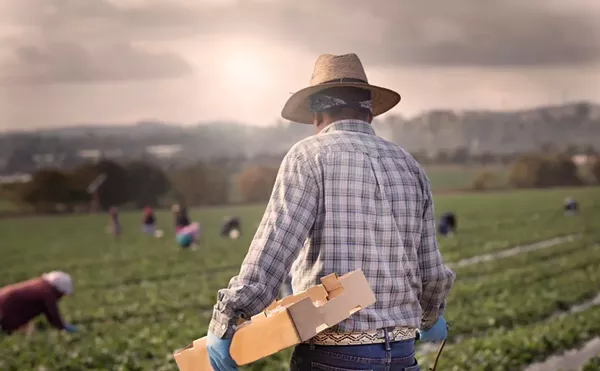
Audio By Carbonatix
[
{
"name": "GPT - Leaderboard - Inline - Content",
"component": "35519556",
"insertPoint": "5th",
"startingPoint": "3",
"requiredCountToDisplay": "3",
"maxInsertions": 100,
"adList": [
{
"adPreset": "LeaderboardInline"
}
]
}
]
Above: Wayne County Michigan Prosecutor Kim Worthy (L) and Law and Order actor and Joyful Heart Foundation founder and president Mariska Hargitay attend the Sexual Assault Kit Evidence Submission Act press conference at Frank Murphy Hall of Justice on March 10, 2014 in Detroit. (Photo by Paul Warner/Getty Images)
It all started in 2009, when Wayne County prosecutor Kym Worthy received notice that more than 11,000 rape kits sat forgotten in a Detroit Police storage unit. 11,431, to be exact. 11,431 kits, representative of 11,431 victims of sexual assault, their bodies examined invasively and exhaustively for DNA evidence. The process can take hours. This, after being raped. This, in hopes of receiving some semblance of justice.
This, for 11,431 Detroiters, to have that evidence sit on a shelf in an old warehouse, neglected.
Not any longer, if the Enough SAID (Sexual Assault in Detroit) project has anything to do with it. A collaboration between the Wayne County Prosecutor’s Office, the Detroit Crime Commission (DCC), and the Michigan Women’s Foundation, Enough SAID’s goals are unequivocal: to raise money to test the kits, to see that the kits are tested, and to make Detroit a safer place.
Unequivocal, but not easily accomplished. Metro Times recently sat down with Peg Tallet, chief community engagement officer for the Michigan Women’s Foundation, to discuss what accomplishing Enough SAID’s goals would require.
“Rape kits traditionally cost $1,500 dollars to test. After you test the 11,431, you then have to investigate,” Tallet said. “You have to find not just the perpetrator, you have to find the women — you have to find the victim. Because some of these (kits) are 25, 30 years old.”
Since Enough SAID’s conception, numerous corporations and wealthy individuals have pledged their financial support to the campaign. Some state and federal money has been granted, as well, allowing about 1,600 of the kits to be tested.
Out of the 1,600 kits tested, 188 serial rapists were identified.
“So we realized the breadth of this,” Tallet said.
The DCC worked with forensic labs to negotiate a discount for the testing, lowering the cost significantly to $490 per kit. Still, in Detroit, municipal money to test the kits is simply not there, making Enough SAID’s fundraising efforts crucial to getting the job done.
Tallet underscored the need for smaller donations from individuals.
“It doesn’t matter to me if it’s one couple who can do $490, or if it’s 49 kids who can do $10 each. That brings justice, that starts the process for one woman,” Tallet said.
She says that rape victims in the city have reached out to Enough SAID. “One woman called me and said, ‘I was raped. My kit is in that stash somewhere. I want to help raise that money.’”
The crisis is not just endemic to Detroit: over 400,000 untested rape kits have been found nationwide. Memphis, Tenn.’s backlog alone contains around 12,000 untested kits — resulting in several lawsuits filed against the city by sexual assault victims angered by the gross negligence.
Detroiters too have wondered: why weren’t these rape kits already processed? Some of them date back to the 1980s. If the kits were “found” in 2009, how were they lost in the first place?
Primarily, there was the issue of money. “Government was really, really stretched, and police departments were losing a lot of funding. Prosecutors' offices were losing a lot of funding,” Tallet said.
But one still has to wonder why processing the evidence and identifying and prosecuting rapists was not always a priority to Detroit law enforcement.
Tallet pointed to a disturbing cultural tendency to blame victims of sexual assault and trivialize their experiences. “I do believe, going back, there was a fair amount of ‘Did you see what she was wearing? Why was she in the dark all alone? She shouldn’t have been there. She was asking for it, basically.’”
Fortunately, according to Tallet, priorities are shifting and mindsets are developing in law enforcement. “I think we don't face [victim blaming] to the degree that we used to.”
Whatever the reason for the backlog, neither Tallet nor Worthy is pointing fingers.
“At first,” Tallet said, “I sat down with Kym, and said, ‘I am outraged.’ And she said, ‘You know, that happened to me at the beginning. But I realized I could spend the rest of my life mad, or I could solve this.’ And so I realized then, I have to give that part up. I can’t change the past, but I can change the present, and I can change the future.”
And the future is more hopeful now for those who aim to bring rapists to justice. In June 2014, Gov. Snyder signed the "Sexual Assault Kit Evidence Submission Act” into law, which places stringent regulations on the processing of rape kits in the state of Michigan, requiring that they be sent to an accredited lab and analyzed within about four months of collection. The bill was passed unanimously in the House and Senate.
Furthermore, the national conversation about sexual assault prevention is picking up, thanks to programs such as the Obama administration’s “It’s On Us” initiative and the tireless work of activists seeking reform on college campuses.
But according to a recent United Nations report, violence against women is still prevalent on a global scale, with about 35 percent of women reporting they had been subjected to physical violence, and 1 in 10 girls under the age of 18 having been raped.
In Detroit, at least, Tallet is hopeful that Enough SAID’s efforts will be effective in significantly curbing sexual assault. She points to educational initiatives focused on preventing sexual assault as programs Enough SAID would like to eventually support. But for now, with so many kits still untested, the coalition must focus its energy and resources on fundraising for processing the kits and prosecuting the perpetrators.
Tallet says this will send an important message about what is acceptable in Detroit.
“Law enforcement has promised us that shining a light on (sexual assault in Detroit) will deter it," she says. "And the effect of seeing successful prosecutions will be very positive, in the sense that people will say: ‘Not in this town. Enough said. I’m not allowing that anymore.’”
To make a donation to Enough SAID or learn more, go to Enough SAID's website.





